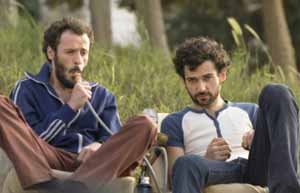NY Muslim film festival shouting to be heard

NEW YORK (Reuters) - More than 30 movies from the Arab and Muslim world will be playing at a week-long New York film festival, but will anybody be watching?
The Alwan Film Festival, created by a nonprofit group in lower Manhattan, features several well-known Middle Eastern directors. The films tackle timely subjects like the war in Iraq, the Israeli-Palestinian conflict and Afghanistan.
With American troops deployed in Iraq and Afghanistan and the West's relations with the Muslim world perhaps the defining challenge of the decade, those involved in the festival want to help Americans learn what the "Muslim world" is all about.
"It's very important that Americans of all backgrounds come and see the films, especially on the event of the fifth year after 9/11," said Bader Ben Hirsi, a British-Yemeni director whose film opened the festival on Friday.
"It's important to see what the Middle East really is. I watch TV here and it's completely different from the Middle East I know," Hirsi said.
But the films are playing at just three lower Manhattan cinemas and the small festival has barely registered on the media radar of the city, coming as it does just before the much bigger Tribeca Film Festival whose program also boasts a substantial number of films from the Muslim world.
Hirsi said he hoped the festival would draw a diverse audience. "It would be nice, but I don't think it will be. I think the people that will turn out will probably be Arab Americans or Arabists," he said.
COMEDY, POLITICS, SEX AND PHILOSOPHY
While several of the Alwan Festival films focus on current affairs, Hirsi says his is a "bittersweet romantic comedy" -- the story of a wealthy young man who is about to get married to a woman he has not met but who falls in love with another woman.
"A New Day in Old Sanaa" is the first feature film made in Yemen, Hirsi said. It was a struggle to make it because of the bureaucracy, funding problems, misunderstanding and suspicion in Yemen, and even an actor getting stabbed, he said.
"I thought the hard part was over but the thing that really I just can't get is, we had incredible reviews ... and we've seen people charmed by this film. But sales agents and distributors don't (get it), and they can't believe it," he said.
"They just don't don't know what to do with it. It's not what they expect from the Arab world."
Highlights of the April 14-23 festival includes "Zaman: The Man from the Reeds" by Amer Alwan, the story of a father's journey from the marshes where he lives to Baghdad to search for a medicine to cure his adopted son.
Another Iraqi film, "Ahlaam" by Mohamed al-Daradji, is set in the days before and after the fall of Baghdad and is the story of a young girl locked up in a mental institute after her husband was arrested under Saddam Hussein. She is freed when her hospital is destroyed by a bomb and she roams the streets amid the chaos of the fall of the city in April 2003.
"Pakistan's Double Game" documents reporter Sharmeen Obaid's travels around her country to ask ordinary citizens what they think of their government's alliance with the United States and backing for its "war on terrorism."
A box office hit in Egypt, Saad Hendawi's "State of Love" is a post-9/11 love story looking at Arabs in the West.
"Sex and Philosophy" from Iran is about a man who decides to introduce his numerous mistresses to each other.
Hirsi said his film's budget was $1.4 million. The films generally have small budgets compared, of course, to Hollywood productions.
Sherif Sadek, one of the curators of the festival, said the ubiquity of American media and culture meant people in the Middle East understood more about America than vice versa.
"There seems to be a one-way street where Americans send information out but it's not receiving information, so hopefully this can provide a different point of view to the mistakes out there and the images being flashed on TV every day," he said.
Hirsi said there was a new wave of film makers from the Muslim world aiming to attract audiences beyond their own borders. "Everybody is frustrated seeing how Western media are depicting the Arab world," he said.
"It's Arab voices coming out for the first time now as opposed to voices from the West on the Arab world. Its Arab film makers saying 'This is our world."'

1 Comments:
Not a lot. It's kind of marketing suicide to a) have it so close to the Tribeca film festival and b) market it as a Muslim film festival. They should have gone the route of movies like 'Paradise Now' and books like 'Reading Lolita in Tehran' and tried to find an angle or some other theme.
Post a Comment
<< Home